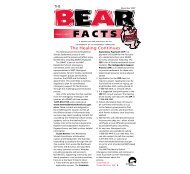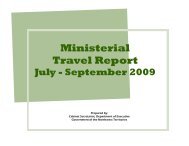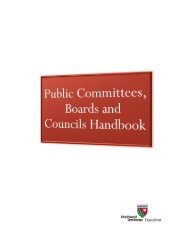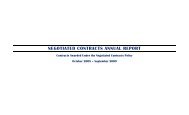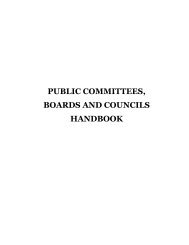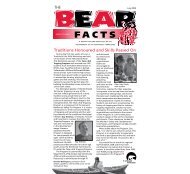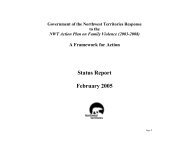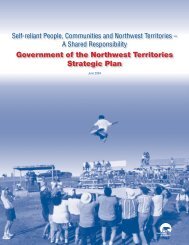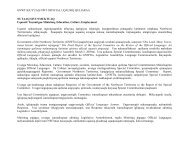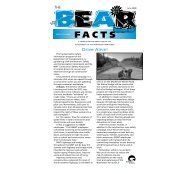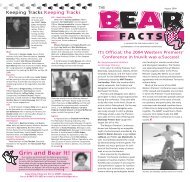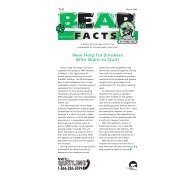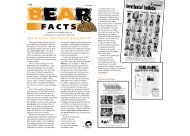Act Now - The Report of the WCB Legislative Review Panel to the
Act Now - The Report of the WCB Legislative Review Panel to the
Act Now - The Report of the WCB Legislative Review Panel to the
- No tags were found...
You also want an ePaper? Increase the reach of your titles
YUMPU automatically turns print PDFs into web optimized ePapers that Google loves.
<strong>The</strong> <strong>Panel</strong> has generally adopted <strong>the</strong> latter position. <strong>The</strong> <strong>Panel</strong> feels that legislationshould not be written for <strong>the</strong> exceptions or <strong>to</strong> provide job descriptions for administration.Legislation should be clear about its intent and provide a framework <strong>to</strong> governadministration. However, part <strong>of</strong> that framework must include <strong>the</strong> standards and meansfor holding governors and administra<strong>to</strong>rs accountable for <strong>the</strong>ir actions.2.4 Adjudication Versus LitigationWorkers’ compensation systems are “no fault” - that is, a system based on results ra<strong>the</strong>rthan laying blame. Injured workers are entitled <strong>to</strong> compensation. Under <strong>the</strong> provisions<strong>of</strong> <strong>the</strong> legislation, administra<strong>to</strong>rs <strong>of</strong> workers’ compensation systems adjudicate anindividual injured worker’s entitlement. Employers are classified on <strong>the</strong> basis <strong>of</strong> <strong>the</strong> risk<strong>the</strong>ir industry poses. If <strong>the</strong>re is a mistake by administra<strong>to</strong>rs, an appeals process isavailable. This is not an adversarial system <strong>to</strong> prove one right and one wrong. This is asystem <strong>to</strong> fulfill a social contract between workers and employers. <strong>The</strong>re should not beany reason <strong>to</strong> litigate.Stakeholders <strong>to</strong>ld <strong>the</strong> <strong>Panel</strong> in many different ways that <strong>the</strong>y perceive <strong>the</strong> system in <strong>the</strong>NWT and Nunavut as an adversarial one. A number <strong>of</strong> stakeholders described it as “a<strong>the</strong>m against us” situation, with <strong>the</strong> <strong>WCB</strong> against <strong>the</strong> injured worker or employer. Tocorrect <strong>the</strong>ir perception <strong>of</strong> <strong>the</strong> situation, stakeholders variously proposed more legalassistance for stakeholders in dealings with <strong>the</strong> <strong>WCB</strong>, or during <strong>the</strong> appeals process,dispute resolution, medical resolutions committees, and opening up <strong>the</strong> exclusivejurisdiction <strong>of</strong> <strong>the</strong> <strong>WCB</strong> over administration <strong>of</strong> <strong>the</strong> <strong>Act</strong>s.<strong>The</strong> <strong>Panel</strong> does not accept that making <strong>the</strong> workers’ compensation system moreadversarial and litigious is an acceptable solution <strong>to</strong> addressing <strong>the</strong> very real problemsraised by stakeholders.<strong>WCB</strong> <strong>Legislative</strong> <strong>Review</strong> <strong>Panel</strong> <strong>Report</strong> Page 8 <strong>of</strong> 128December, 2001



